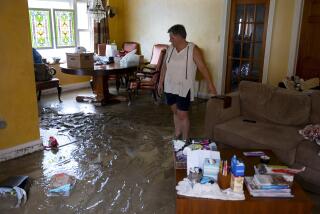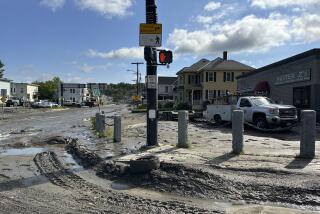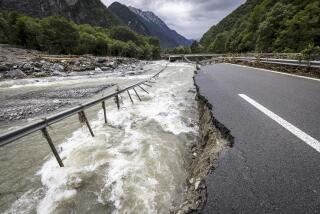Hundreds stranded in Montana after ice and snow give way to floods
About 350 people were stranded in eastern Montana on Tuesday when rivers overflowed their banks because of melting ice and snow.
Hundreds of residents just outside the town of Roundup, about 50 miles north of Billings, have been cut off from outside help for more than a day after the Musselshell River burst through a dike and covered a crucial access road with several feet of water, officials and residents told the Los Angeles Times.
The water is “up to the fence posts” and has gotten so high between the town and the stranded residents that “the county actually has a hard time getting a ‘road closed’ sign in on our side,” Lance Redding, one of the stranded residents, told The Times.
Flooding has been reported in several other counties beyond Musselshell County, where the stranded residents live. Flooding was blamed for at least one death in Lewis and Clark County, where officials said a man died of a heart attack Thursday while preparing for the rising waters.
The deluge has been at least partly driven by a particularly harsh winter, which dumped the second-largest amount of snow on Billings since National Weather Service record-keeping began.
Officials also blamed so-called “ice jams,” in which big chunks of ice can either cause a buildup of water upstream, or push water faster downstream, or plug up narrow river channels.
One ice jam in Glendive, Mont., caused the river to rise eight feet in less than 15 minutes Monday, officials said.
Along the Musselshell River near Roundup, the crisis arrived in two similar bursts: The water went from about one foot deep to five feet deep between Friday and Saturday, and then the river swelled from about six feet to 12 feet deep between Sunday and Monday, according to measurements from the U.S. Geological Survey.
That’s when as many as 550 local residents became stranded, Jeff Gates, the Musselshell County director of disaster and emergency services, told The Times.
That figure had dropped to 350 residents by Tuesday, though the rescue effort was hampered by messy backroads as officials called for “rougher folks” to come help place sandbags to stave off the invading waters.
“It’s just turned our gravel roads into a quagmire,” Gates said. “I’m thinking this is going to be a long couple of weeks.”
A similar crisis played out in the floods of 2011, which had officials shipping emergency supplies to Roundup’s outlying residents by boat as they waited three weeks for the waters to recede.
The Reddings had moved to the area more recently, however, and were caught off guard by how vulnerable their high-lying home was to the waters that claimed the low-lying road into town.
“We weren’t really prepared like most of the people,“ Kara Redding told The Times in a phone interview Tuesday. “We’re not considered a flood zone where our house is, so we didn’t think that would be an issue, but the road is a different story.”
An elevated train track still provided a dry pathway into town, but only by foot, leaving many of the residents to rely on themselves and each other until the waters recede -- or until officials decide enough time has passed that it becomes necessary to start sending boats across the floodwaters.
Neighbors “brought over a box of fruits and vegetables that they had stocked up, and we got some wood from some of the neighbors, and we shared it with an older lady down the road to make sure we all stay warm,” Redding said.
Farmers in the area were moving their livestock to high ground, and some were worried that calves would be especially vulnerable to the disruption, she added. “No one really sits down there and waits for people to come down and help,” said her husband, Lance.
For now, they’re on their own, not that anyone seems to be in too much trouble -- yet. Redding hoped she would be able to make it into town Wednesday.
“I know last time [a flood stranded the area] it was two to three weeks,” Redding said, expressing optimism about the situation. “If it ends up being that long, then this would be a different conversation.”
Follow LATimes National on Facebook
More to Read
Sign up for Essential California
The most important California stories and recommendations in your inbox every morning.
You may occasionally receive promotional content from the Los Angeles Times.











